Critical Evaluation: Cultural and HRM Issues in IHRM (RSVP Case)
VerifiedAdded on 2022/11/25
|9
|3243
|94
Report
AI Summary
This report provides a critical evaluation of cultural and HRM issues faced by organizations in international human resource management (IHRM). Focusing on a case study of RSVP, a UK-based call center, the report examines the challenges associated with expanding operations to Japan. It delves into cultural considerations such as language, ethics, values, and cultural preferences, utilizing the Charles Handy model of culture to analyze different work environments. Furthermore, the report addresses crucial HRM issues including recruitment, training and development, cultural diversities, and language barriers. It applies Herzberg's two-factor theory to understand motivation within an international context, highlighting motivational and hygiene factors. The report offers insights into the complexities of managing human resources across international borders and provides practical considerations for companies seeking global expansion.
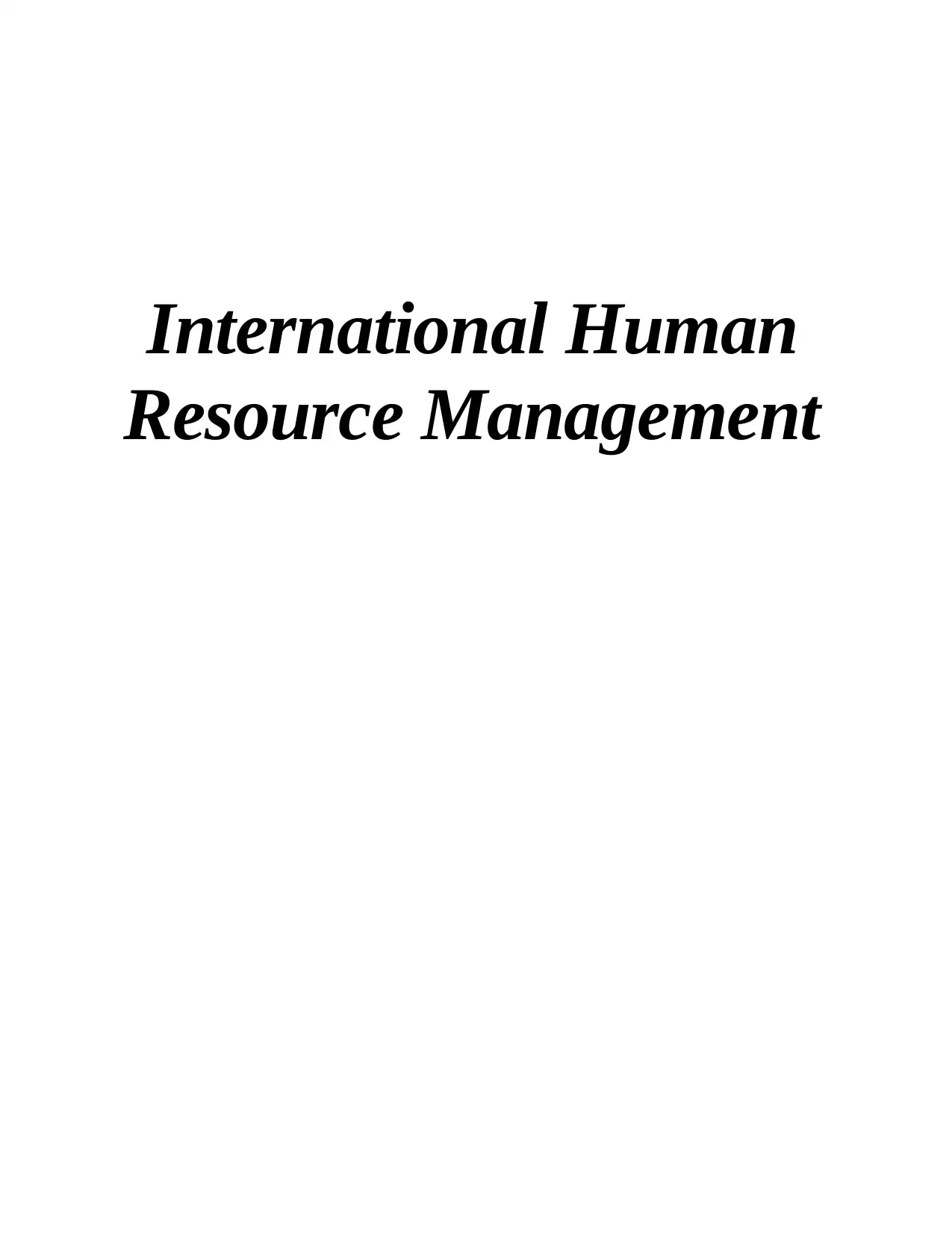
International Human
Resource Management
Resource Management
Paraphrase This Document
Need a fresh take? Get an instant paraphrase of this document with our AI Paraphraser
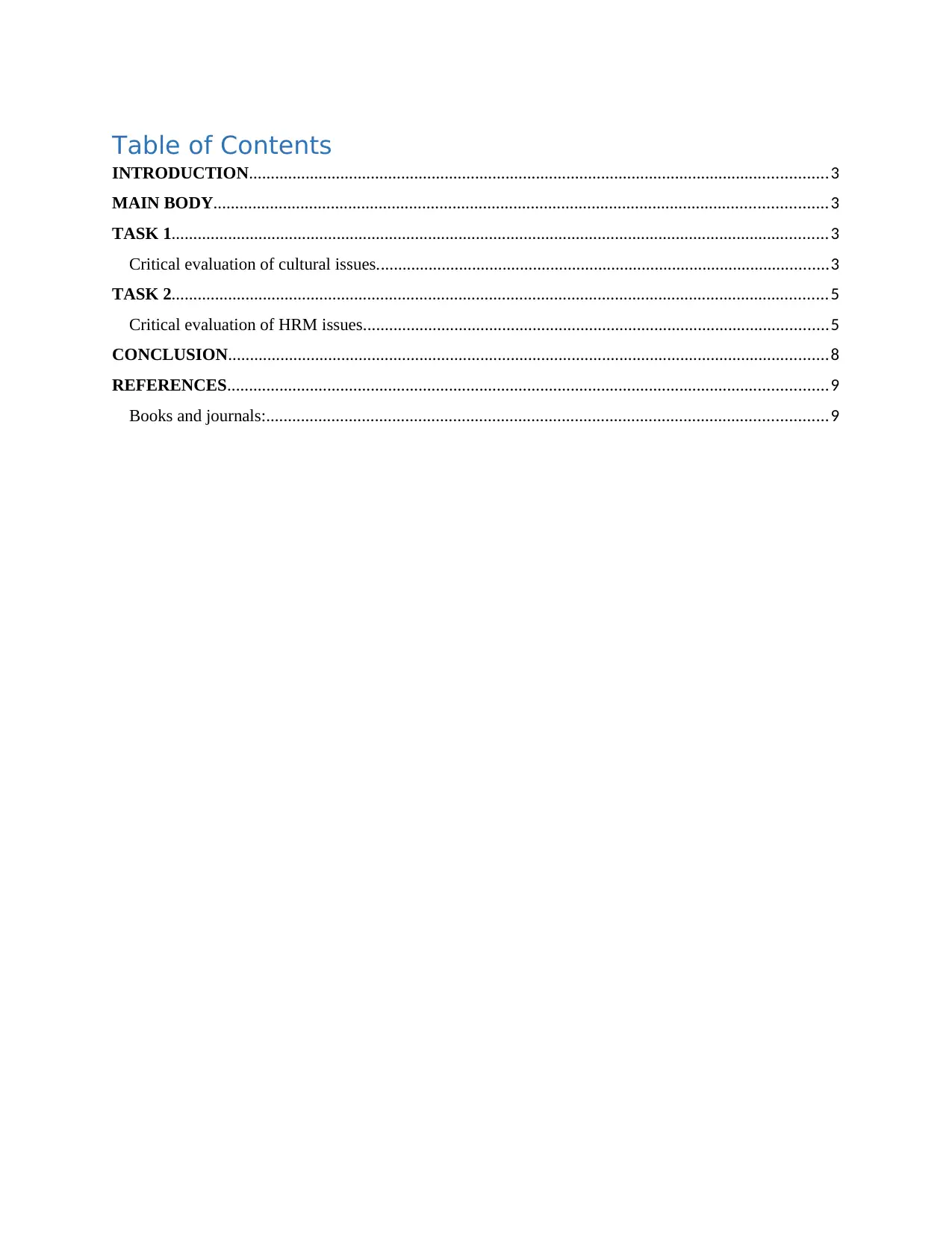
Table of Contents
INTRODUCTION.....................................................................................................................................3
MAIN BODY.............................................................................................................................................3
TASK 1.......................................................................................................................................................3
Critical evaluation of cultural issues........................................................................................................3
TASK 2.......................................................................................................................................................5
Critical evaluation of HRM issues...........................................................................................................5
CONCLUSION..........................................................................................................................................8
REFERENCES..........................................................................................................................................9
Books and journals:.................................................................................................................................9
INTRODUCTION.....................................................................................................................................3
MAIN BODY.............................................................................................................................................3
TASK 1.......................................................................................................................................................3
Critical evaluation of cultural issues........................................................................................................3
TASK 2.......................................................................................................................................................5
Critical evaluation of HRM issues...........................................................................................................5
CONCLUSION..........................................................................................................................................8
REFERENCES..........................................................................................................................................9
Books and journals:.................................................................................................................................9
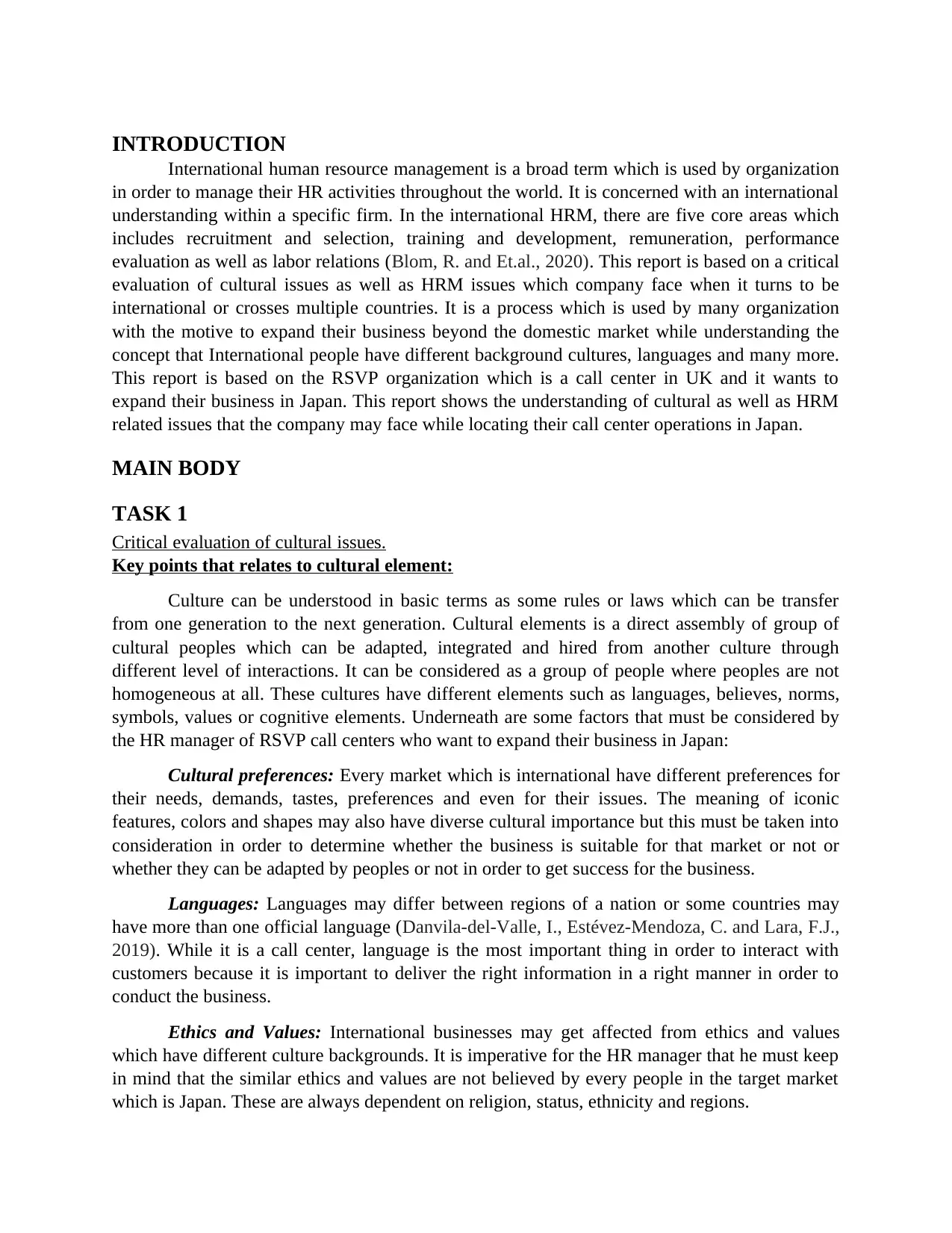
INTRODUCTION
International human resource management is a broad term which is used by organization
in order to manage their HR activities throughout the world. It is concerned with an international
understanding within a specific firm. In the international HRM, there are five core areas which
includes recruitment and selection, training and development, remuneration, performance
evaluation as well as labor relations (Blom, R. and Et.al., 2020). This report is based on a critical
evaluation of cultural issues as well as HRM issues which company face when it turns to be
international or crosses multiple countries. It is a process which is used by many organization
with the motive to expand their business beyond the domestic market while understanding the
concept that International people have different background cultures, languages and many more.
This report is based on the RSVP organization which is a call center in UK and it wants to
expand their business in Japan. This report shows the understanding of cultural as well as HRM
related issues that the company may face while locating their call center operations in Japan.
MAIN BODY
TASK 1
Critical evaluation of cultural issues.
Key points that relates to cultural element:
Culture can be understood in basic terms as some rules or laws which can be transfer
from one generation to the next generation. Cultural elements is a direct assembly of group of
cultural peoples which can be adapted, integrated and hired from another culture through
different level of interactions. It can be considered as a group of people where peoples are not
homogeneous at all. These cultures have different elements such as languages, believes, norms,
symbols, values or cognitive elements. Underneath are some factors that must be considered by
the HR manager of RSVP call centers who want to expand their business in Japan:
Cultural preferences: Every market which is international have different preferences for
their needs, demands, tastes, preferences and even for their issues. The meaning of iconic
features, colors and shapes may also have diverse cultural importance but this must be taken into
consideration in order to determine whether the business is suitable for that market or not or
whether they can be adapted by peoples or not in order to get success for the business.
Languages: Languages may differ between regions of a nation or some countries may
have more than one official language (Danvila-del-Valle, I., Estévez-Mendoza, C. and Lara, F.J.,
2019). While it is a call center, language is the most important thing in order to interact with
customers because it is important to deliver the right information in a right manner in order to
conduct the business.
Ethics and Values: International businesses may get affected from ethics and values
which have different culture backgrounds. It is imperative for the HR manager that he must keep
in mind that the similar ethics and values are not believed by every people in the target market
which is Japan. These are always dependent on religion, status, ethnicity and regions.
International human resource management is a broad term which is used by organization
in order to manage their HR activities throughout the world. It is concerned with an international
understanding within a specific firm. In the international HRM, there are five core areas which
includes recruitment and selection, training and development, remuneration, performance
evaluation as well as labor relations (Blom, R. and Et.al., 2020). This report is based on a critical
evaluation of cultural issues as well as HRM issues which company face when it turns to be
international or crosses multiple countries. It is a process which is used by many organization
with the motive to expand their business beyond the domestic market while understanding the
concept that International people have different background cultures, languages and many more.
This report is based on the RSVP organization which is a call center in UK and it wants to
expand their business in Japan. This report shows the understanding of cultural as well as HRM
related issues that the company may face while locating their call center operations in Japan.
MAIN BODY
TASK 1
Critical evaluation of cultural issues.
Key points that relates to cultural element:
Culture can be understood in basic terms as some rules or laws which can be transfer
from one generation to the next generation. Cultural elements is a direct assembly of group of
cultural peoples which can be adapted, integrated and hired from another culture through
different level of interactions. It can be considered as a group of people where peoples are not
homogeneous at all. These cultures have different elements such as languages, believes, norms,
symbols, values or cognitive elements. Underneath are some factors that must be considered by
the HR manager of RSVP call centers who want to expand their business in Japan:
Cultural preferences: Every market which is international have different preferences for
their needs, demands, tastes, preferences and even for their issues. The meaning of iconic
features, colors and shapes may also have diverse cultural importance but this must be taken into
consideration in order to determine whether the business is suitable for that market or not or
whether they can be adapted by peoples or not in order to get success for the business.
Languages: Languages may differ between regions of a nation or some countries may
have more than one official language (Danvila-del-Valle, I., Estévez-Mendoza, C. and Lara, F.J.,
2019). While it is a call center, language is the most important thing in order to interact with
customers because it is important to deliver the right information in a right manner in order to
conduct the business.
Ethics and Values: International businesses may get affected from ethics and values
which have different culture backgrounds. It is imperative for the HR manager that he must keep
in mind that the similar ethics and values are not believed by every people in the target market
which is Japan. These are always dependent on religion, status, ethnicity and regions.
⊘ This is a preview!⊘
Do you want full access?
Subscribe today to unlock all pages.

Trusted by 1+ million students worldwide
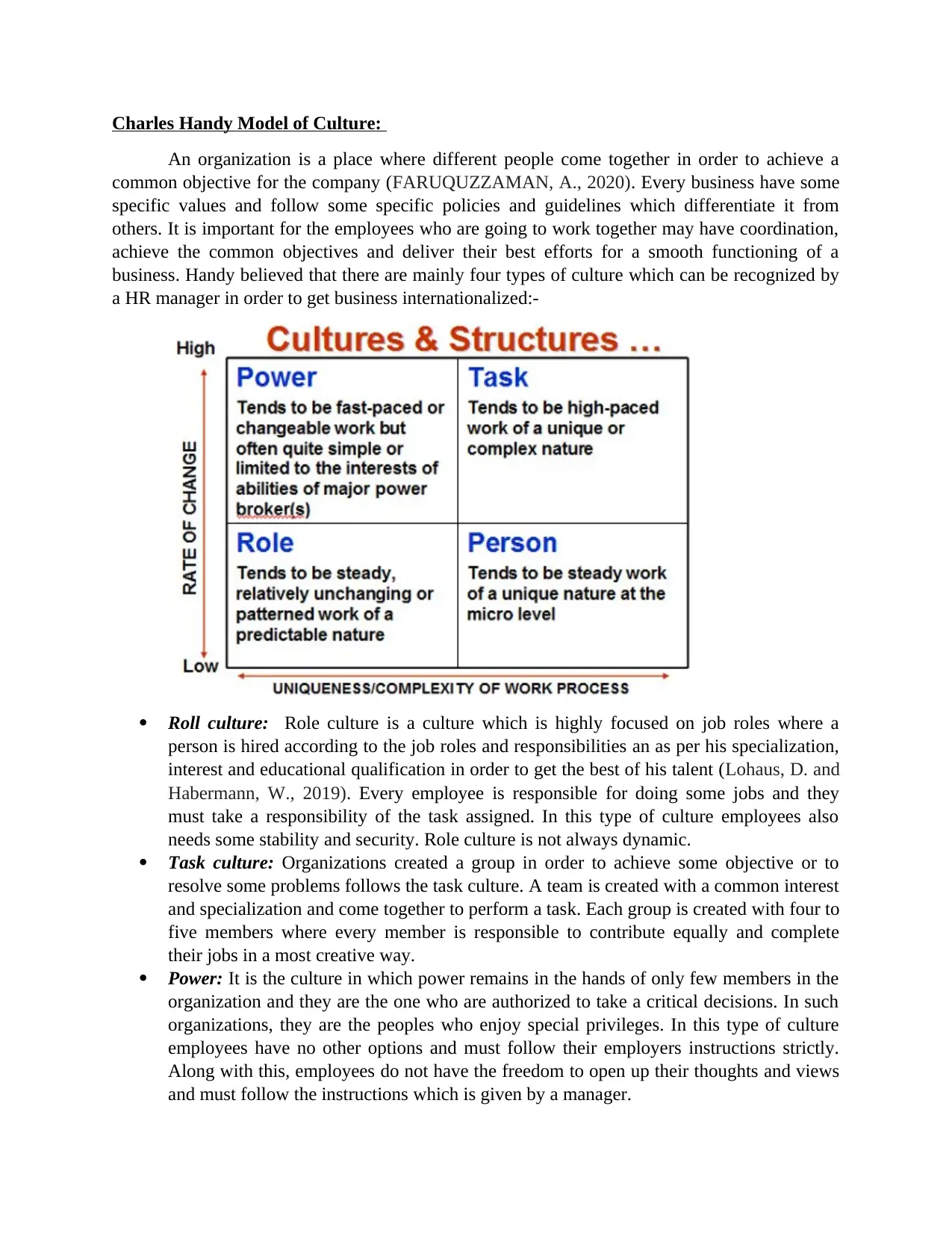
Charles Handy Model of Culture:
An organization is a place where different people come together in order to achieve a
common objective for the company (FARUQUZZAMAN, A., 2020). Every business have some
specific values and follow some specific policies and guidelines which differentiate it from
others. It is important for the employees who are going to work together may have coordination,
achieve the common objectives and deliver their best efforts for a smooth functioning of a
business. Handy believed that there are mainly four types of culture which can be recognized by
a HR manager in order to get business internationalized:-
Roll culture: Role culture is a culture which is highly focused on job roles where a
person is hired according to the job roles and responsibilities an as per his specialization,
interest and educational qualification in order to get the best of his talent (Lohaus, D. and
Habermann, W., 2019). Every employee is responsible for doing some jobs and they
must take a responsibility of the task assigned. In this type of culture employees also
needs some stability and security. Role culture is not always dynamic.
Task culture: Organizations created a group in order to achieve some objective or to
resolve some problems follows the task culture. A team is created with a common interest
and specialization and come together to perform a task. Each group is created with four to
five members where every member is responsible to contribute equally and complete
their jobs in a most creative way.
Power: It is the culture in which power remains in the hands of only few members in the
organization and they are the one who are authorized to take a critical decisions. In such
organizations, they are the peoples who enjoy special privileges. In this type of culture
employees have no other options and must follow their employers instructions strictly.
Along with this, employees do not have the freedom to open up their thoughts and views
and must follow the instructions which is given by a manager.
An organization is a place where different people come together in order to achieve a
common objective for the company (FARUQUZZAMAN, A., 2020). Every business have some
specific values and follow some specific policies and guidelines which differentiate it from
others. It is important for the employees who are going to work together may have coordination,
achieve the common objectives and deliver their best efforts for a smooth functioning of a
business. Handy believed that there are mainly four types of culture which can be recognized by
a HR manager in order to get business internationalized:-
Roll culture: Role culture is a culture which is highly focused on job roles where a
person is hired according to the job roles and responsibilities an as per his specialization,
interest and educational qualification in order to get the best of his talent (Lohaus, D. and
Habermann, W., 2019). Every employee is responsible for doing some jobs and they
must take a responsibility of the task assigned. In this type of culture employees also
needs some stability and security. Role culture is not always dynamic.
Task culture: Organizations created a group in order to achieve some objective or to
resolve some problems follows the task culture. A team is created with a common interest
and specialization and come together to perform a task. Each group is created with four to
five members where every member is responsible to contribute equally and complete
their jobs in a most creative way.
Power: It is the culture in which power remains in the hands of only few members in the
organization and they are the one who are authorized to take a critical decisions. In such
organizations, they are the peoples who enjoy special privileges. In this type of culture
employees have no other options and must follow their employers instructions strictly.
Along with this, employees do not have the freedom to open up their thoughts and views
and must follow the instructions which is given by a manager.
Paraphrase This Document
Need a fresh take? Get an instant paraphrase of this document with our AI Paraphraser
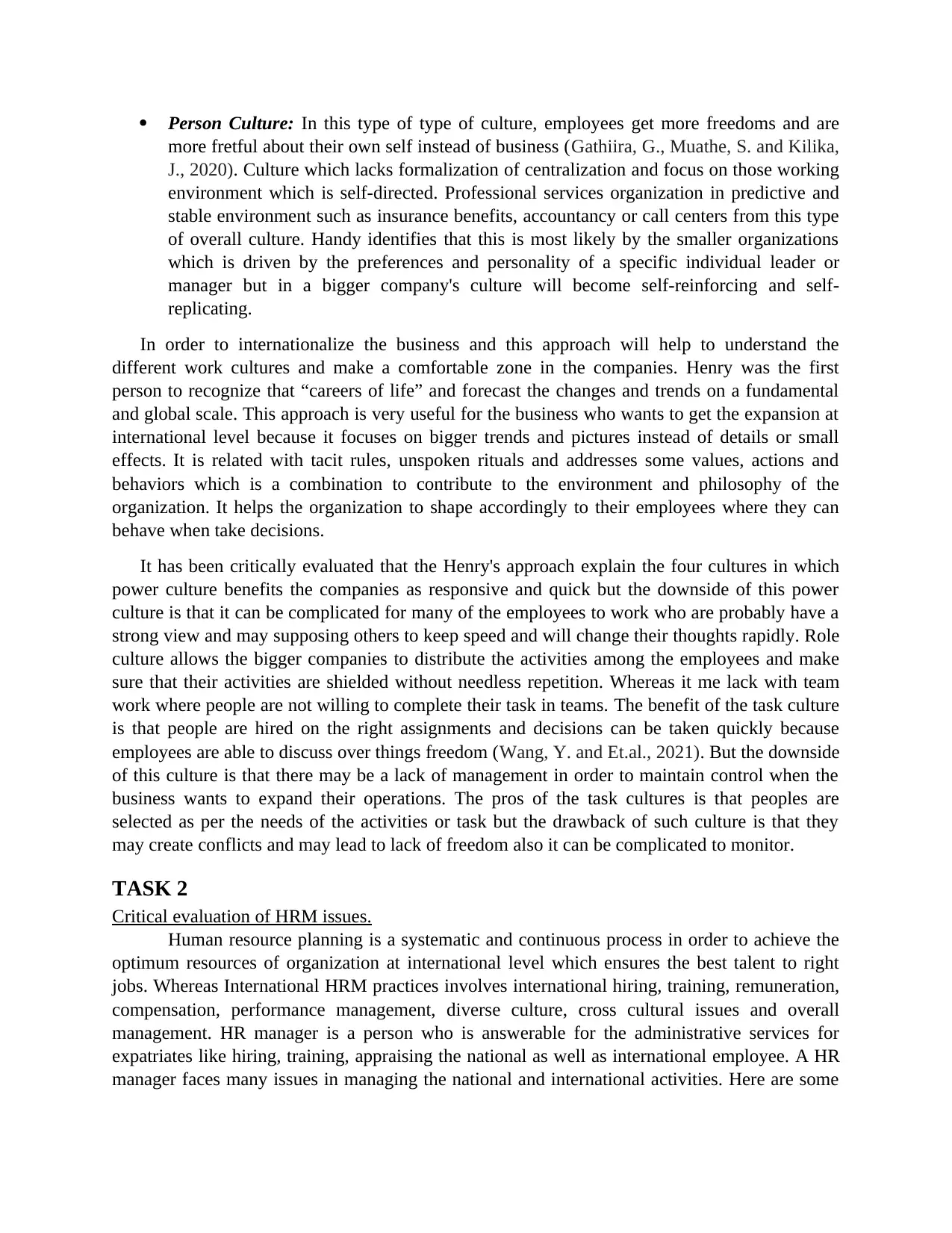
Person Culture: In this type of type of culture, employees get more freedoms and are
more fretful about their own self instead of business (Gathiira, G., Muathe, S. and Kilika,
J., 2020). Culture which lacks formalization of centralization and focus on those working
environment which is self-directed. Professional services organization in predictive and
stable environment such as insurance benefits, accountancy or call centers from this type
of overall culture. Handy identifies that this is most likely by the smaller organizations
which is driven by the preferences and personality of a specific individual leader or
manager but in a bigger company's culture will become self-reinforcing and self-
replicating.
In order to internationalize the business and this approach will help to understand the
different work cultures and make a comfortable zone in the companies. Henry was the first
person to recognize that “careers of life” and forecast the changes and trends on a fundamental
and global scale. This approach is very useful for the business who wants to get the expansion at
international level because it focuses on bigger trends and pictures instead of details or small
effects. It is related with tacit rules, unspoken rituals and addresses some values, actions and
behaviors which is a combination to contribute to the environment and philosophy of the
organization. It helps the organization to shape accordingly to their employees where they can
behave when take decisions.
It has been critically evaluated that the Henry's approach explain the four cultures in which
power culture benefits the companies as responsive and quick but the downside of this power
culture is that it can be complicated for many of the employees to work who are probably have a
strong view and may supposing others to keep speed and will change their thoughts rapidly. Role
culture allows the bigger companies to distribute the activities among the employees and make
sure that their activities are shielded without needless repetition. Whereas it me lack with team
work where people are not willing to complete their task in teams. The benefit of the task culture
is that people are hired on the right assignments and decisions can be taken quickly because
employees are able to discuss over things freedom (Wang, Y. and Et.al., 2021). But the downside
of this culture is that there may be a lack of management in order to maintain control when the
business wants to expand their operations. The pros of the task cultures is that peoples are
selected as per the needs of the activities or task but the drawback of such culture is that they
may create conflicts and may lead to lack of freedom also it can be complicated to monitor.
TASK 2
Critical evaluation of HRM issues.
Human resource planning is a systematic and continuous process in order to achieve the
optimum resources of organization at international level which ensures the best talent to right
jobs. Whereas International HRM practices involves international hiring, training, remuneration,
compensation, performance management, diverse culture, cross cultural issues and overall
management. HR manager is a person who is answerable for the administrative services for
expatriates like hiring, training, appraising the national as well as international employee. A HR
manager faces many issues in managing the national and international activities. Here are some
more fretful about their own self instead of business (Gathiira, G., Muathe, S. and Kilika,
J., 2020). Culture which lacks formalization of centralization and focus on those working
environment which is self-directed. Professional services organization in predictive and
stable environment such as insurance benefits, accountancy or call centers from this type
of overall culture. Handy identifies that this is most likely by the smaller organizations
which is driven by the preferences and personality of a specific individual leader or
manager but in a bigger company's culture will become self-reinforcing and self-
replicating.
In order to internationalize the business and this approach will help to understand the
different work cultures and make a comfortable zone in the companies. Henry was the first
person to recognize that “careers of life” and forecast the changes and trends on a fundamental
and global scale. This approach is very useful for the business who wants to get the expansion at
international level because it focuses on bigger trends and pictures instead of details or small
effects. It is related with tacit rules, unspoken rituals and addresses some values, actions and
behaviors which is a combination to contribute to the environment and philosophy of the
organization. It helps the organization to shape accordingly to their employees where they can
behave when take decisions.
It has been critically evaluated that the Henry's approach explain the four cultures in which
power culture benefits the companies as responsive and quick but the downside of this power
culture is that it can be complicated for many of the employees to work who are probably have a
strong view and may supposing others to keep speed and will change their thoughts rapidly. Role
culture allows the bigger companies to distribute the activities among the employees and make
sure that their activities are shielded without needless repetition. Whereas it me lack with team
work where people are not willing to complete their task in teams. The benefit of the task culture
is that people are hired on the right assignments and decisions can be taken quickly because
employees are able to discuss over things freedom (Wang, Y. and Et.al., 2021). But the downside
of this culture is that there may be a lack of management in order to maintain control when the
business wants to expand their operations. The pros of the task cultures is that peoples are
selected as per the needs of the activities or task but the drawback of such culture is that they
may create conflicts and may lead to lack of freedom also it can be complicated to monitor.
TASK 2
Critical evaluation of HRM issues.
Human resource planning is a systematic and continuous process in order to achieve the
optimum resources of organization at international level which ensures the best talent to right
jobs. Whereas International HRM practices involves international hiring, training, remuneration,
compensation, performance management, diverse culture, cross cultural issues and overall
management. HR manager is a person who is answerable for the administrative services for
expatriates like hiring, training, appraising the national as well as international employee. A HR
manager faces many issues in managing the national and international activities. Here are some
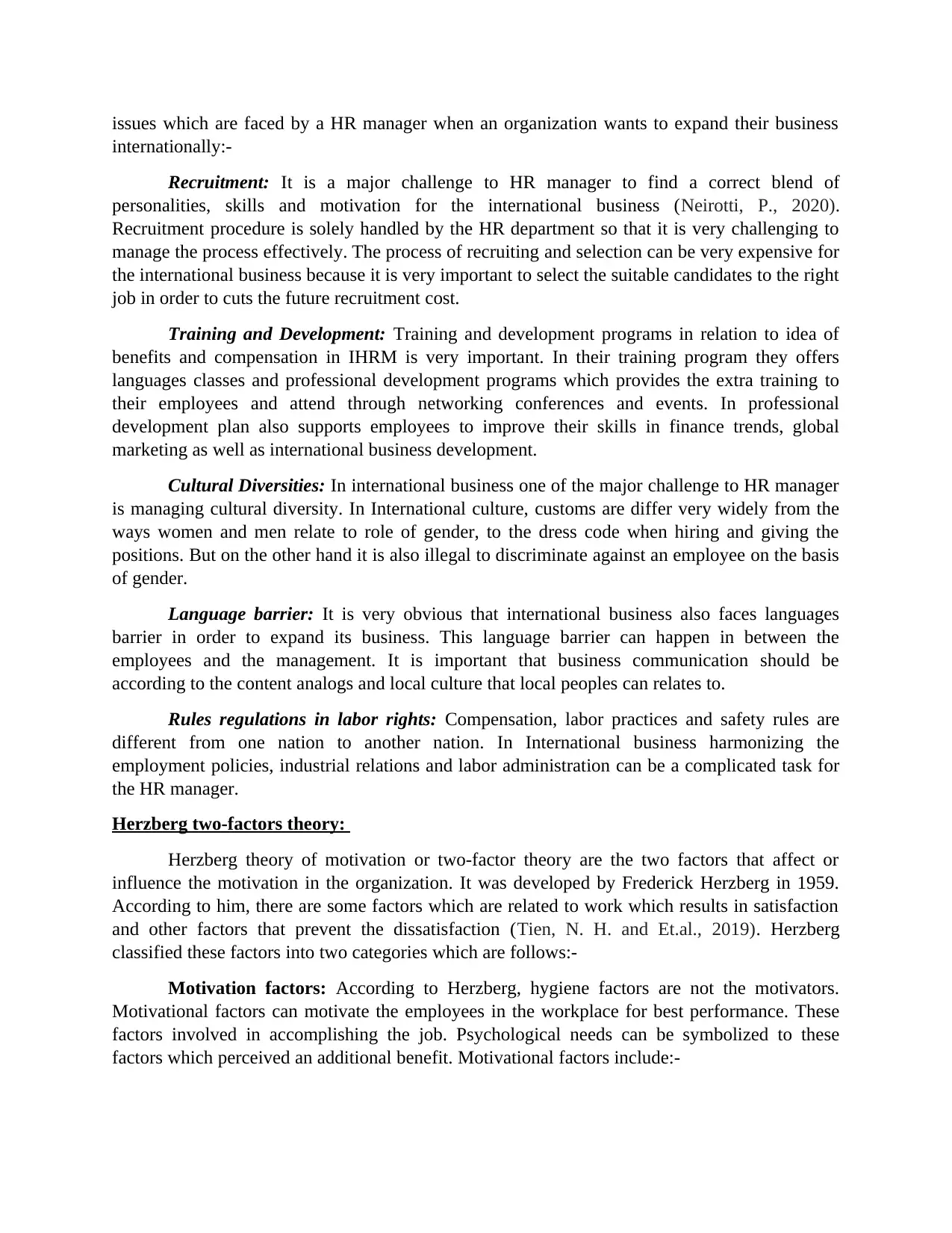
issues which are faced by a HR manager when an organization wants to expand their business
internationally:-
Recruitment: It is a major challenge to HR manager to find a correct blend of
personalities, skills and motivation for the international business (Neirotti, P., 2020).
Recruitment procedure is solely handled by the HR department so that it is very challenging to
manage the process effectively. The process of recruiting and selection can be very expensive for
the international business because it is very important to select the suitable candidates to the right
job in order to cuts the future recruitment cost.
Training and Development: Training and development programs in relation to idea of
benefits and compensation in IHRM is very important. In their training program they offers
languages classes and professional development programs which provides the extra training to
their employees and attend through networking conferences and events. In professional
development plan also supports employees to improve their skills in finance trends, global
marketing as well as international business development.
Cultural Diversities: In international business one of the major challenge to HR manager
is managing cultural diversity. In International culture, customs are differ very widely from the
ways women and men relate to role of gender, to the dress code when hiring and giving the
positions. But on the other hand it is also illegal to discriminate against an employee on the basis
of gender.
Language barrier: It is very obvious that international business also faces languages
barrier in order to expand its business. This language barrier can happen in between the
employees and the management. It is important that business communication should be
according to the content analogs and local culture that local peoples can relates to.
Rules regulations in labor rights: Compensation, labor practices and safety rules are
different from one nation to another nation. In International business harmonizing the
employment policies, industrial relations and labor administration can be a complicated task for
the HR manager.
Herzberg two-factors theory:
Herzberg theory of motivation or two-factor theory are the two factors that affect or
influence the motivation in the organization. It was developed by Frederick Herzberg in 1959.
According to him, there are some factors which are related to work which results in satisfaction
and other factors that prevent the dissatisfaction (Tien, N. H. and Et.al., 2019). Herzberg
classified these factors into two categories which are follows:-
Motivation factors: According to Herzberg, hygiene factors are not the motivators.
Motivational factors can motivate the employees in the workplace for best performance. These
factors involved in accomplishing the job. Psychological needs can be symbolized to these
factors which perceived an additional benefit. Motivational factors include:-
internationally:-
Recruitment: It is a major challenge to HR manager to find a correct blend of
personalities, skills and motivation for the international business (Neirotti, P., 2020).
Recruitment procedure is solely handled by the HR department so that it is very challenging to
manage the process effectively. The process of recruiting and selection can be very expensive for
the international business because it is very important to select the suitable candidates to the right
job in order to cuts the future recruitment cost.
Training and Development: Training and development programs in relation to idea of
benefits and compensation in IHRM is very important. In their training program they offers
languages classes and professional development programs which provides the extra training to
their employees and attend through networking conferences and events. In professional
development plan also supports employees to improve their skills in finance trends, global
marketing as well as international business development.
Cultural Diversities: In international business one of the major challenge to HR manager
is managing cultural diversity. In International culture, customs are differ very widely from the
ways women and men relate to role of gender, to the dress code when hiring and giving the
positions. But on the other hand it is also illegal to discriminate against an employee on the basis
of gender.
Language barrier: It is very obvious that international business also faces languages
barrier in order to expand its business. This language barrier can happen in between the
employees and the management. It is important that business communication should be
according to the content analogs and local culture that local peoples can relates to.
Rules regulations in labor rights: Compensation, labor practices and safety rules are
different from one nation to another nation. In International business harmonizing the
employment policies, industrial relations and labor administration can be a complicated task for
the HR manager.
Herzberg two-factors theory:
Herzberg theory of motivation or two-factor theory are the two factors that affect or
influence the motivation in the organization. It was developed by Frederick Herzberg in 1959.
According to him, there are some factors which are related to work which results in satisfaction
and other factors that prevent the dissatisfaction (Tien, N. H. and Et.al., 2019). Herzberg
classified these factors into two categories which are follows:-
Motivation factors: According to Herzberg, hygiene factors are not the motivators.
Motivational factors can motivate the employees in the workplace for best performance. These
factors involved in accomplishing the job. Psychological needs can be symbolized to these
factors which perceived an additional benefit. Motivational factors include:-
⊘ This is a preview!⊘
Do you want full access?
Subscribe today to unlock all pages.

Trusted by 1+ million students worldwide
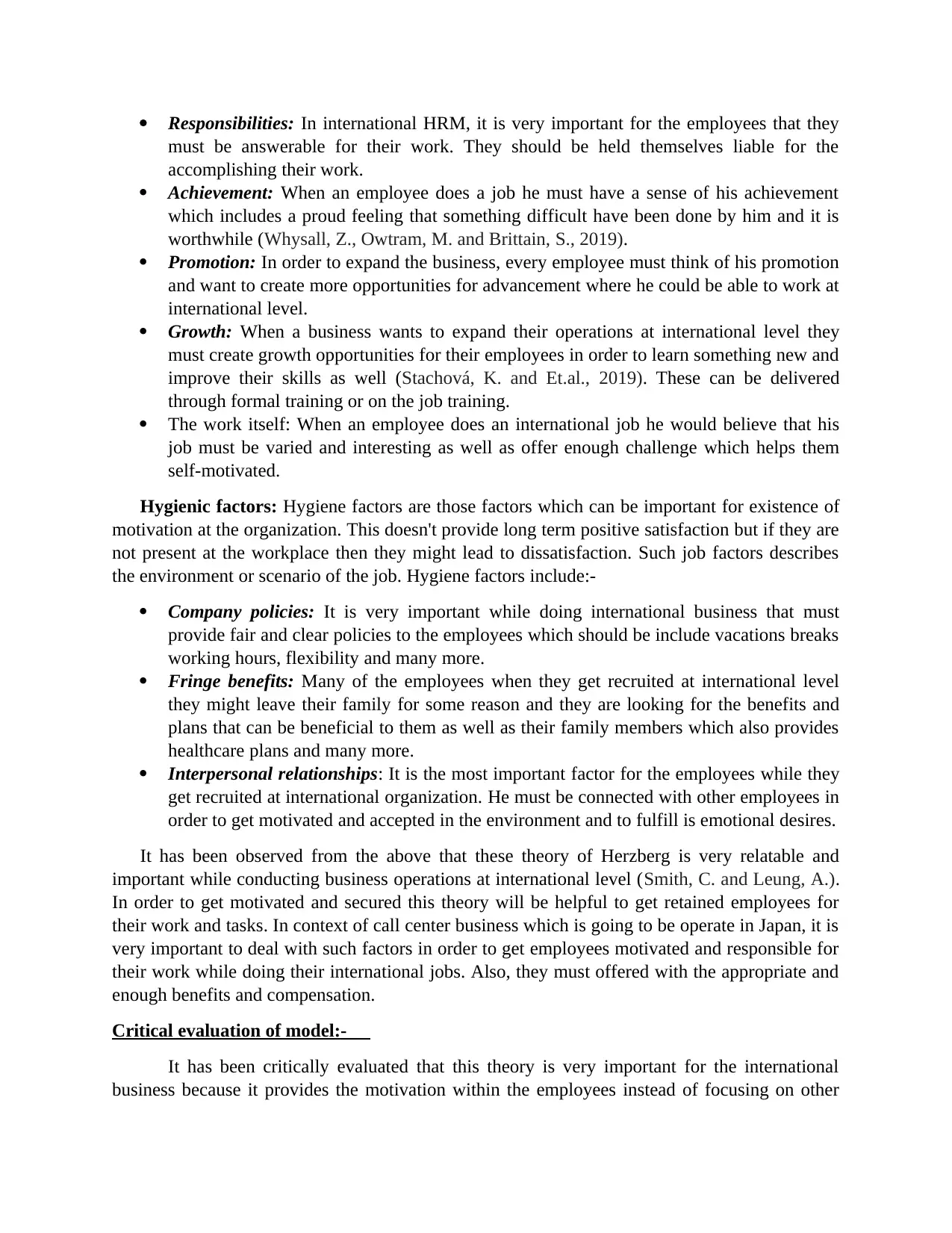
Responsibilities: In international HRM, it is very important for the employees that they
must be answerable for their work. They should be held themselves liable for the
accomplishing their work.
Achievement: When an employee does a job he must have a sense of his achievement
which includes a proud feeling that something difficult have been done by him and it is
worthwhile (Whysall, Z., Owtram, M. and Brittain, S., 2019).
Promotion: In order to expand the business, every employee must think of his promotion
and want to create more opportunities for advancement where he could be able to work at
international level.
Growth: When a business wants to expand their operations at international level they
must create growth opportunities for their employees in order to learn something new and
improve their skills as well (Stachová, K. and Et.al., 2019). These can be delivered
through formal training or on the job training.
The work itself: When an employee does an international job he would believe that his
job must be varied and interesting as well as offer enough challenge which helps them
self-motivated.
Hygienic factors: Hygiene factors are those factors which can be important for existence of
motivation at the organization. This doesn't provide long term positive satisfaction but if they are
not present at the workplace then they might lead to dissatisfaction. Such job factors describes
the environment or scenario of the job. Hygiene factors include:-
Company policies: It is very important while doing international business that must
provide fair and clear policies to the employees which should be include vacations breaks
working hours, flexibility and many more.
Fringe benefits: Many of the employees when they get recruited at international level
they might leave their family for some reason and they are looking for the benefits and
plans that can be beneficial to them as well as their family members which also provides
healthcare plans and many more.
Interpersonal relationships: It is the most important factor for the employees while they
get recruited at international organization. He must be connected with other employees in
order to get motivated and accepted in the environment and to fulfill is emotional desires.
It has been observed from the above that these theory of Herzberg is very relatable and
important while conducting business operations at international level (Smith, C. and Leung, A.).
In order to get motivated and secured this theory will be helpful to get retained employees for
their work and tasks. In context of call center business which is going to be operate in Japan, it is
very important to deal with such factors in order to get employees motivated and responsible for
their work while doing their international jobs. Also, they must offered with the appropriate and
enough benefits and compensation.
Critical evaluation of model:-
It has been critically evaluated that this theory is very important for the international
business because it provides the motivation within the employees instead of focusing on other
must be answerable for their work. They should be held themselves liable for the
accomplishing their work.
Achievement: When an employee does a job he must have a sense of his achievement
which includes a proud feeling that something difficult have been done by him and it is
worthwhile (Whysall, Z., Owtram, M. and Brittain, S., 2019).
Promotion: In order to expand the business, every employee must think of his promotion
and want to create more opportunities for advancement where he could be able to work at
international level.
Growth: When a business wants to expand their operations at international level they
must create growth opportunities for their employees in order to learn something new and
improve their skills as well (Stachová, K. and Et.al., 2019). These can be delivered
through formal training or on the job training.
The work itself: When an employee does an international job he would believe that his
job must be varied and interesting as well as offer enough challenge which helps them
self-motivated.
Hygienic factors: Hygiene factors are those factors which can be important for existence of
motivation at the organization. This doesn't provide long term positive satisfaction but if they are
not present at the workplace then they might lead to dissatisfaction. Such job factors describes
the environment or scenario of the job. Hygiene factors include:-
Company policies: It is very important while doing international business that must
provide fair and clear policies to the employees which should be include vacations breaks
working hours, flexibility and many more.
Fringe benefits: Many of the employees when they get recruited at international level
they might leave their family for some reason and they are looking for the benefits and
plans that can be beneficial to them as well as their family members which also provides
healthcare plans and many more.
Interpersonal relationships: It is the most important factor for the employees while they
get recruited at international organization. He must be connected with other employees in
order to get motivated and accepted in the environment and to fulfill is emotional desires.
It has been observed from the above that these theory of Herzberg is very relatable and
important while conducting business operations at international level (Smith, C. and Leung, A.).
In order to get motivated and secured this theory will be helpful to get retained employees for
their work and tasks. In context of call center business which is going to be operate in Japan, it is
very important to deal with such factors in order to get employees motivated and responsible for
their work while doing their international jobs. Also, they must offered with the appropriate and
enough benefits and compensation.
Critical evaluation of model:-
It has been critically evaluated that this theory is very important for the international
business because it provides the motivation within the employees instead of focusing on other
Paraphrase This Document
Need a fresh take? Get an instant paraphrase of this document with our AI Paraphraser
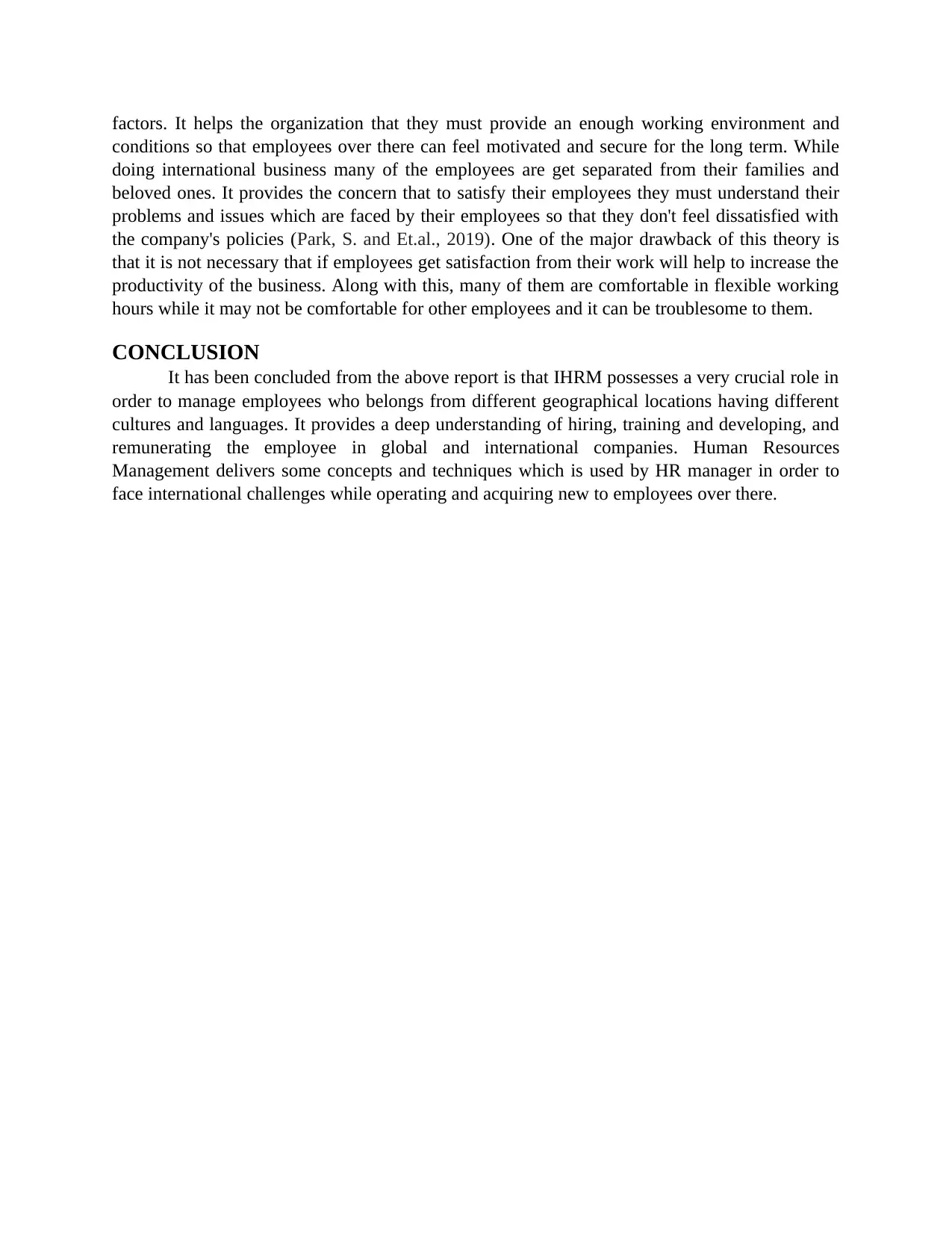
factors. It helps the organization that they must provide an enough working environment and
conditions so that employees over there can feel motivated and secure for the long term. While
doing international business many of the employees are get separated from their families and
beloved ones. It provides the concern that to satisfy their employees they must understand their
problems and issues which are faced by their employees so that they don't feel dissatisfied with
the company's policies (Park, S. and Et.al., 2019). One of the major drawback of this theory is
that it is not necessary that if employees get satisfaction from their work will help to increase the
productivity of the business. Along with this, many of them are comfortable in flexible working
hours while it may not be comfortable for other employees and it can be troublesome to them.
CONCLUSION
It has been concluded from the above report is that IHRM possesses a very crucial role in
order to manage employees who belongs from different geographical locations having different
cultures and languages. It provides a deep understanding of hiring, training and developing, and
remunerating the employee in global and international companies. Human Resources
Management delivers some concepts and techniques which is used by HR manager in order to
face international challenges while operating and acquiring new to employees over there.
conditions so that employees over there can feel motivated and secure for the long term. While
doing international business many of the employees are get separated from their families and
beloved ones. It provides the concern that to satisfy their employees they must understand their
problems and issues which are faced by their employees so that they don't feel dissatisfied with
the company's policies (Park, S. and Et.al., 2019). One of the major drawback of this theory is
that it is not necessary that if employees get satisfaction from their work will help to increase the
productivity of the business. Along with this, many of them are comfortable in flexible working
hours while it may not be comfortable for other employees and it can be troublesome to them.
CONCLUSION
It has been concluded from the above report is that IHRM possesses a very crucial role in
order to manage employees who belongs from different geographical locations having different
cultures and languages. It provides a deep understanding of hiring, training and developing, and
remunerating the employee in global and international companies. Human Resources
Management delivers some concepts and techniques which is used by HR manager in order to
face international challenges while operating and acquiring new to employees over there.
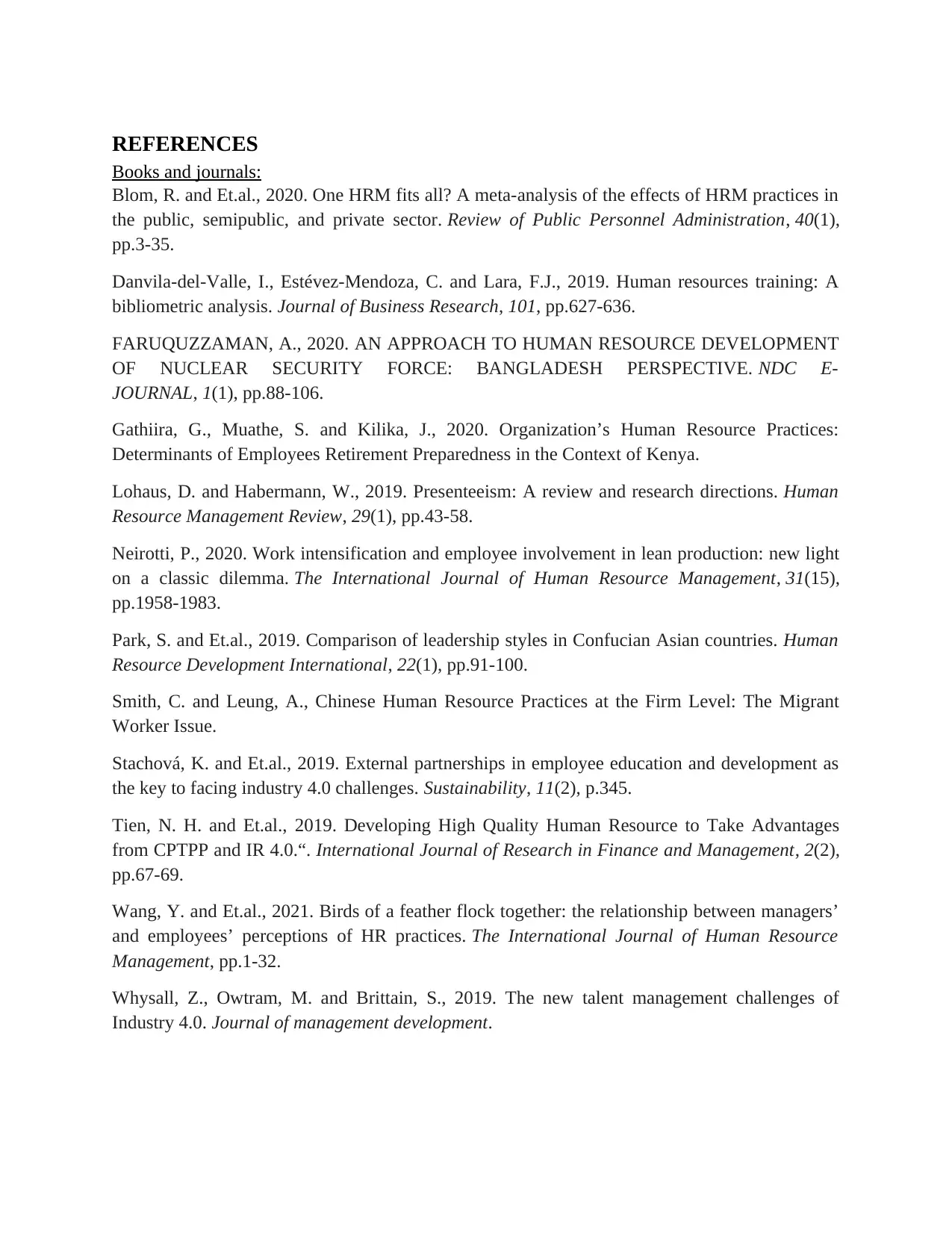
REFERENCES
Books and journals:
Blom, R. and Et.al., 2020. One HRM fits all? A meta-analysis of the effects of HRM practices in
the public, semipublic, and private sector. Review of Public Personnel Administration, 40(1),
pp.3-35.
Danvila-del-Valle, I., Estévez-Mendoza, C. and Lara, F.J., 2019. Human resources training: A
bibliometric analysis. Journal of Business Research, 101, pp.627-636.
FARUQUZZAMAN, A., 2020. AN APPROACH TO HUMAN RESOURCE DEVELOPMENT
OF NUCLEAR SECURITY FORCE: BANGLADESH PERSPECTIVE. NDC E-
JOURNAL, 1(1), pp.88-106.
Gathiira, G., Muathe, S. and Kilika, J., 2020. Organization’s Human Resource Practices:
Determinants of Employees Retirement Preparedness in the Context of Kenya.
Lohaus, D. and Habermann, W., 2019. Presenteeism: A review and research directions. Human
Resource Management Review, 29(1), pp.43-58.
Neirotti, P., 2020. Work intensification and employee involvement in lean production: new light
on a classic dilemma. The International Journal of Human Resource Management, 31(15),
pp.1958-1983.
Park, S. and Et.al., 2019. Comparison of leadership styles in Confucian Asian countries. Human
Resource Development International, 22(1), pp.91-100.
Smith, C. and Leung, A., Chinese Human Resource Practices at the Firm Level: The Migrant
Worker Issue.
Stachová, K. and Et.al., 2019. External partnerships in employee education and development as
the key to facing industry 4.0 challenges. Sustainability, 11(2), p.345.
Tien, N. H. and Et.al., 2019. Developing High Quality Human Resource to Take Advantages
from CPTPP and IR 4.0.“. International Journal of Research in Finance and Management, 2(2),
pp.67-69.
Wang, Y. and Et.al., 2021. Birds of a feather flock together: the relationship between managers’
and employees’ perceptions of HR practices. The International Journal of Human Resource
Management, pp.1-32.
Whysall, Z., Owtram, M. and Brittain, S., 2019. The new talent management challenges of
Industry 4.0. Journal of management development.
Books and journals:
Blom, R. and Et.al., 2020. One HRM fits all? A meta-analysis of the effects of HRM practices in
the public, semipublic, and private sector. Review of Public Personnel Administration, 40(1),
pp.3-35.
Danvila-del-Valle, I., Estévez-Mendoza, C. and Lara, F.J., 2019. Human resources training: A
bibliometric analysis. Journal of Business Research, 101, pp.627-636.
FARUQUZZAMAN, A., 2020. AN APPROACH TO HUMAN RESOURCE DEVELOPMENT
OF NUCLEAR SECURITY FORCE: BANGLADESH PERSPECTIVE. NDC E-
JOURNAL, 1(1), pp.88-106.
Gathiira, G., Muathe, S. and Kilika, J., 2020. Organization’s Human Resource Practices:
Determinants of Employees Retirement Preparedness in the Context of Kenya.
Lohaus, D. and Habermann, W., 2019. Presenteeism: A review and research directions. Human
Resource Management Review, 29(1), pp.43-58.
Neirotti, P., 2020. Work intensification and employee involvement in lean production: new light
on a classic dilemma. The International Journal of Human Resource Management, 31(15),
pp.1958-1983.
Park, S. and Et.al., 2019. Comparison of leadership styles in Confucian Asian countries. Human
Resource Development International, 22(1), pp.91-100.
Smith, C. and Leung, A., Chinese Human Resource Practices at the Firm Level: The Migrant
Worker Issue.
Stachová, K. and Et.al., 2019. External partnerships in employee education and development as
the key to facing industry 4.0 challenges. Sustainability, 11(2), p.345.
Tien, N. H. and Et.al., 2019. Developing High Quality Human Resource to Take Advantages
from CPTPP and IR 4.0.“. International Journal of Research in Finance and Management, 2(2),
pp.67-69.
Wang, Y. and Et.al., 2021. Birds of a feather flock together: the relationship between managers’
and employees’ perceptions of HR practices. The International Journal of Human Resource
Management, pp.1-32.
Whysall, Z., Owtram, M. and Brittain, S., 2019. The new talent management challenges of
Industry 4.0. Journal of management development.
⊘ This is a preview!⊘
Do you want full access?
Subscribe today to unlock all pages.

Trusted by 1+ million students worldwide
1 out of 9
Related Documents
Your All-in-One AI-Powered Toolkit for Academic Success.
+13062052269
info@desklib.com
Available 24*7 on WhatsApp / Email
![[object Object]](/_next/static/media/star-bottom.7253800d.svg)
Unlock your academic potential
Copyright © 2020–2026 A2Z Services. All Rights Reserved. Developed and managed by ZUCOL.





